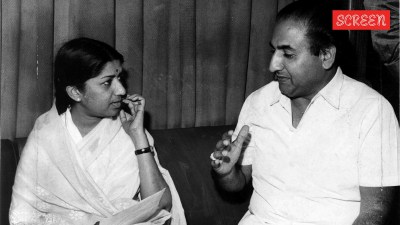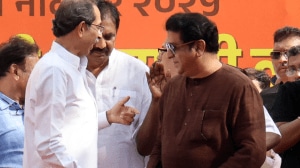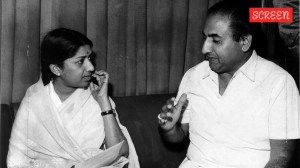An open letter to Digvijay Singh
As you know, many citizens have of late been distressed by your attempts to open up more spaces for mixing religion and politics. Your attem...

As you know, many citizens have of late been distressed by your attempts to open up more spaces for mixing religion and politics. Your attempts to put cow protection center stage, your flirting with the issue of Bhojshala have, at best, distracted from the more substantial issues of politics. At worst, they will contribute a good deal to make the political, social and intellectual climate in this country more incendiary and surcharged. Many citizens had seen you as a repository of new hope, as a source of rejuvenating the Congress and as a politician who can imaginatively link political prudence to new social experiments. Your electorate had given you the unusual honor of re-electing you on the basis of these hopes. I am sure that many of your policies bear imperfections as policy in a democratic society inevitably does. But your attempts to mobilise Dalit politics, to at least think of limited land reform, to start new experiments in the delivery of education services bore the hallmarks of a promising kind of politics. But your recent turn threatens to fritter all that away.
It would be inappropriate to comment on the specific issues of cow protection and Bhojshala in this space, but it is difficult not to think of their larger meaning within Indian politics. You have claimed that you do not share the BJP version of Hindutva. Certainly your politics does not have the venomous anti-minority edge of Hindutva, at least not yet. You have also claimed, in invoking Gandhi and cow protection, that some aspects of Hindutva politics have always been part of the Congress agenda. That proposition is undoubtedly true. But I would have thought that you would, at the beginning of a new century, reflect upon the consequences of the Congress flirting with religious politics.
Of course we have the benefit of hindsight, but the entry of religious identities in politics in the twenties and thirties unleashed a dangerous dynamic that even the Congress could not control. More recently, the Congress brought ruin to Punjab by dabbling in religious politics there. And Rajiv Gandhi8217;s permission to open up the site at Ayodhya has had consequences whose brutality we are still living with. Whenever religious identities enter politics in a substantive way, they unleash destructive forces no one can control. If Gandhi could not rein in the rise of the Hindu right; if Indira Gandhi could not control the consequences of creating Bhindranwale, if Rajiv Gandhi vitiated Indian politics by pandering both to minority and majority fundamentalism, should we still hold onto the illusion that religion will enter politics quietly, protect its cows and go away? We had hoped that someone with a keen sense of history like you will draw the right lessons from the Congress8217; compromises with religion, not invoke them as an example. If you can think you can ride 8216;soft Hindutva8217;, you are sadly mistaken. By raising dormant issues, you are letting Hindutva move into new constituencies. Hindutva can be tamed not by appropriating its issues, but by making sure that its issues do not become dominant in our politics. History has taught us this lesson. Fanaticism spreads not by a growth in the number of fanatics, but because those with unfanatical dispositions are tempted to flirt with it for their own ends.
Your party is in crisis. It is in the hands of a leader whose political views are an odd combination of platitudes and negativity. She has surrounded herself with the Ambika Sonis and the Kamal Naths, compromised relics of past misrule. Except for a few exceptions it does not have the intellectual firepower to match its opponents. It is so unsure of its convictions that it does not even claim credit for its achievement in initiating economic reform. Its organisation is moribund. Congress was a successful political party because it had the capacity to absorb new social constituencies. But a party that is run as a small coterie, legitimised by a spineless culture of deference, can hardly incorporate new aspirations easily. Hence your declining presence in states like UP and Bihar.
You were, along with a couple of other chief ministers, the exception to this trend. You were partly responsible for preventing the rot that has set in your party from reaching Madhya Pradesh. You were trying to craft a new social coalition. Whether or not you implemented all of them, you appeared to be interested in ideas, itself a rare commodity in Indian politics. That strategy worked for you in Madhya Pradesh. Sure, you may not win the next election. Our electorate will not let anyone take it for granted. But for you to convert politics into a performative ritual around issues that corrode the polity and divide it is not the right answer to your predicament. You may reap some uncertain short-term benefit, but you will have frittered away your long-term identity.
Of course, it would be foolish to ignore political considerations. But a genuine leader has the capacity to operate with an enlarged and long-term conception of prudence. This is a conception of prudence that recognises that a reputation for principle is itself a politically important commodity, this is a conception of prudence that can combine a quest for power with a transformative social agenda. The test of a true leader is to operate under this conception of prudence, and not simply wait, as your party seems to be doing, for the revolving door of politics to catapult them to power. If you worry less about the election and more about the high ideals that brought you into politics in the first place, you would be using your talents to rejuvenate your party, to serving the electorate, to repairing the fragile social bonds among the citizenry, to creating an atmosphere that is conducive to building a free and just society that was the basis of the new social contract we ratified in our Constitution. Don8217;t let the serious business of the citizenry be relegated to unimportance by a politics of gimmicks, and don8217;t open up new spaces for the diabolical politics of Hindutva to enter. Who knows, if the electorate is wise enough, they might even reward you for your principles in a manner more enduringly than you can imagine. Even if you lose, at least you will have this consolation: it mattered to the country that you lost.
The writer is professor of philosophy and of law and governance, JNU
- 01
- 02
- 03
- 04
- 05































